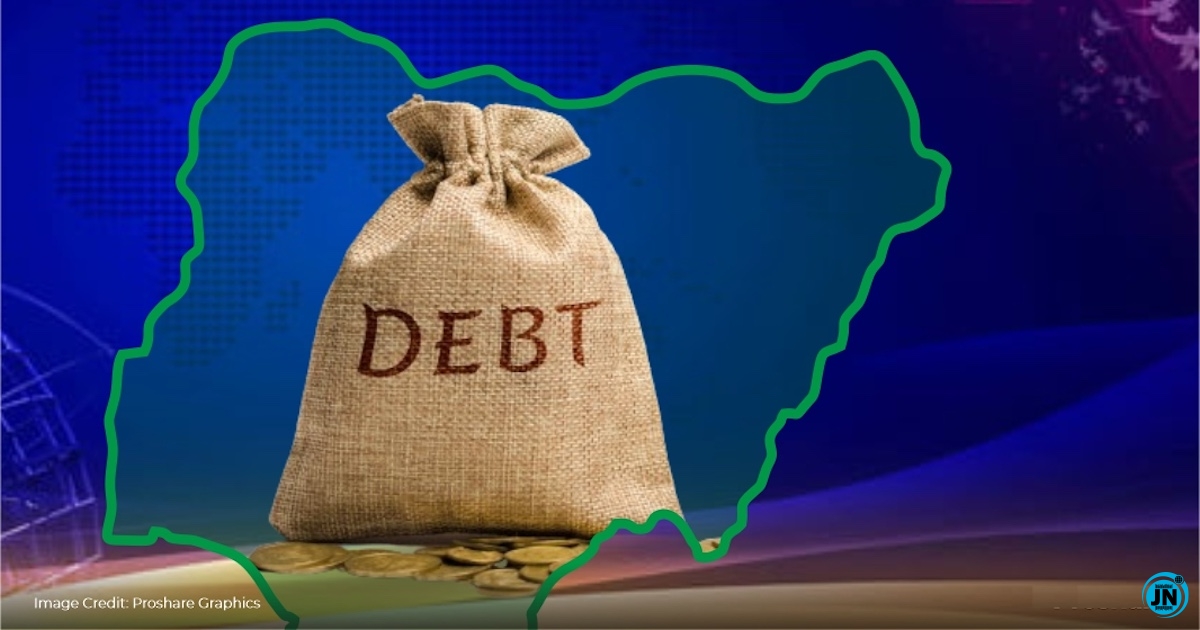
New data released by the Debt Management Office (DMO) has revealed that Nigeria’s total public debt stock has reached a record high of ₦149.39 trillion as of March 31, 2025. This represents a significant year-on-year increase of ₦27.72 trillion or 22.8% compared to ₦121.67 trillion reported in the same period last year (March 2024).
Quarter-on-quarter, the nation’s debt portfolio climbed by ₦4.72 trillion or 3.3%, rising from ₦144.67 trillion recorded at the end of December 2024. This continuous upward trajectory in Nigeria’s debt reflects ongoing fiscal pressures, increased borrowing needs, and the economic consequences of naira depreciation.
External debt jumps to ₦70.63 trillion amid weaker naira
Breaking down the figures, Nigeria’s external debt now stands at ₦70.63 trillion (equivalent to $45.98 billion) as of Q1 2025. This marks a sharp year-on-year surge of ₦14.61 trillion or 26.1% from ₦56.02 trillion ($42.12 billion) in March 2024.
On a quarterly basis, external debt in naira terms saw a smaller increase of ₦344 billion or 0.5% from ₦70.29 trillion recorded in December 2024. While the dollar value of external debt increased by $3.86 billion, the much larger jump in naira terms underscores the impact of exchange rate fluctuations.
The Central Bank of Nigeria (CBN) used an official exchange rate of ₦1,330.26 per US dollar for Q1 2024. Although the specific exchange rate for Q1 2025 has not been officially disclosed, analysts suggest further depreciation of the naira likely contributed to higher naira-denominated debt figures, making external obligations more expensive to service.
Nigeria’s external debt portfolio is made up of loans from multilateral creditors like the World Bank and African Development Bank, bilateral loans from partner countries, and commercial loans, including Eurobonds. As the naira weakens, the cost of repaying these external loans continues to balloon, heightening concerns around long-term debt sustainability and external vulnerability.
Domestic debt surges to ₦78.76 trillion amid expanding fiscal deficits
On the domestic front, Nigeria’s debt climbed to ₦78.76 trillion ($51.26 billion) by the end of March 2025. This reflects a year-on-year increase of ₦13.11 trillion or 20% from ₦65.65 trillion in March 2024.
Quarter-on-quarter, domestic debt rose by ₦4.38 trillion or 5.9% compared to ₦74.38 trillion as of December 2024, indicating a continued reliance on local borrowing to fund budget deficits and manage fiscal operations.
Of the total domestic debt, the Federal Government accounts for a substantial ₦74.89 trillion, while the combined domestic debt of the 36 states and the Federal Capital Territory (FCT) stands at ₦3.87 trillion. Notably, subnational domestic debt fell slightly from ₦3.97 trillion in Q4 2024 and ₦4.07 trillion in Q1 2024, suggesting either a decline in new borrowing by states or improved repayment performance.
Domestic debt is primarily financed through instruments such as Nigerian Treasury Bills, Federal Government Bonds, Sukuk, and Green Bonds. While these instruments provide a more stable source of financing compared to foreign loans, they still pose significant interest payment obligations that put pressure on government revenue.
Debt breakdown summary for Q1 2025
The data below summarizes the key components of Nigeria’s public debt as of Q1 2025:
Category — Q1 2024 — Q4 2024 — Q1 2025 — Change (YoY) — Change (QoQ)
Total Public Debt: ₦121.67 trillion — ₦144.67 trillion — ₦149.39 trillion — +₦27.72 trillion (+22.8%) — +₦4.72 trillion (+3.3%)
External Debt (₦): ₦56.02 trillion — ₦70.29 trillion — ₦70.63 trillion — +₦14.61 trillion (+26.1%) — +₦344 billion (+0.5%)
External Debt (USD): $42.12 billion — N/A — $45.98 billion — +$3.86 billion — N/A
Exchange Rate (CBN): ₦1,330.26/$1 — N/A — Not disclosed — Naira depreciation (implied) — Naira depreciation (implied)
Domestic Debt: ₦65.65 trillion — ₦74.38 trillion — ₦78.76 trillion — +₦13.11 trillion (+20%) — +₦4.38 trillion (+5.9%)
– FG Domestic Debt: N/A — N/A — ₦74.89 trillion — N/A — N/A
– States + FCT Domestic Debt: ₦4.07 trillion — ₦3.97 trillion — ₦3.87 trillion — –₦200 billion (–4.9%) — –₦100 billion (–2.5%)
With the rising debt levels and increasing debt servicing costs, economic experts continue to call for more prudent fiscal management, diversified revenue sources, and urgent economic reforms to mitigate the risk of a debt crisis and ensure long-term sustainability.

